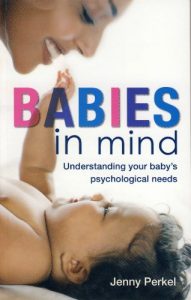Babies in Mind will help you and your baby through the beautiful - but sometimes bumpy - road of infancy and early parenthood. Find out how to handle sleep difficulties, excessive crying and feeding problems. Discover what postnatal depression is really about and what to do if you are feeling anxious, stressed or depressed. Learn about what stresses your baby out, what she needs from you and why.
You are given no special training or expertise in order to become a parent, although you are biologically equipped to have children from your teens onwards. You—like everyone—carry psychological baggage from your own unique baby and childhood experiences. Some of this baggage might create difficulties in your own parenting. Although I believe that most people should not be told how to parent, I think it could benefit your child psychologically, both now and in the long term, if you knew certain things about your baby’s mind and internal world.
The type of environment that babies are exposed to plays a huge role in how their brains will ultimately be wired. Neuroscientific research is now revealing the way in which adverse experiences in infancy cause lifelong alterations in brain functioning. The implications of this are that if your baby is stressed out now, she could develop a heightened vulnerability to stressors throughout life. Her brain becomes permanently wired to be on the alert – to react as though she were in danger. This book aims to make you more conscious and aware of your baby’s mind so that you can help give your baby what she needs in order to grow into a psychologically robust and healthy individual.
I hope that after reading this book, you will be able to set aside the parenting rules and instead tune into your baby. The moment-by-moment, ongoing exchanges, encounters and communications between you and your baby will help her create her own template for relating to herself and the world in the years to come. There is much focus these days on getting babies to sleep, putting them on routines, and stimulating them to make them clever. While these are perhaps important to some extent, what is much more important is that you create an emotionally safe environment for your baby so that she learns about trust. Establishing trust is the crucial psychological task of infancy.
You are given no special training or expertise in order to become a parent, although you are biologically equipped to have children from your teens onwards. You—like everyone—carry psychological baggage from your own unique baby and childhood experiences. Some of this baggage might create difficulties in your own parenting. Although I believe that most people should not be told how to parent, I think it could benefit your child psychologically, both now and in the long term, if you knew certain things about your baby’s mind and internal world.
The type of environment that babies are exposed to plays a huge role in how their brains will ultimately be wired. Neuroscientific research is now revealing the way in which adverse experiences in infancy cause lifelong alterations in brain functioning. The implications of this are that if your baby is stressed out now, she could develop a heightened vulnerability to stressors throughout life. Her brain becomes permanently wired to be on the alert – to react as though she were in danger. This book aims to make you more conscious and aware of your baby’s mind so that you can help give your baby what she needs in order to grow into a psychologically robust and healthy individual.
I hope that after reading this book, you will be able to set aside the parenting rules and instead tune into your baby. The moment-by-moment, ongoing exchanges, encounters and communications between you and your baby will help her create her own template for relating to herself and the world in the years to come. There is much focus these days on getting babies to sleep, putting them on routines, and stimulating them to make them clever. While these are perhaps important to some extent, what is much more important is that you create an emotionally safe environment for your baby so that she learns about trust. Establishing trust is the crucial psychological task of infancy.






